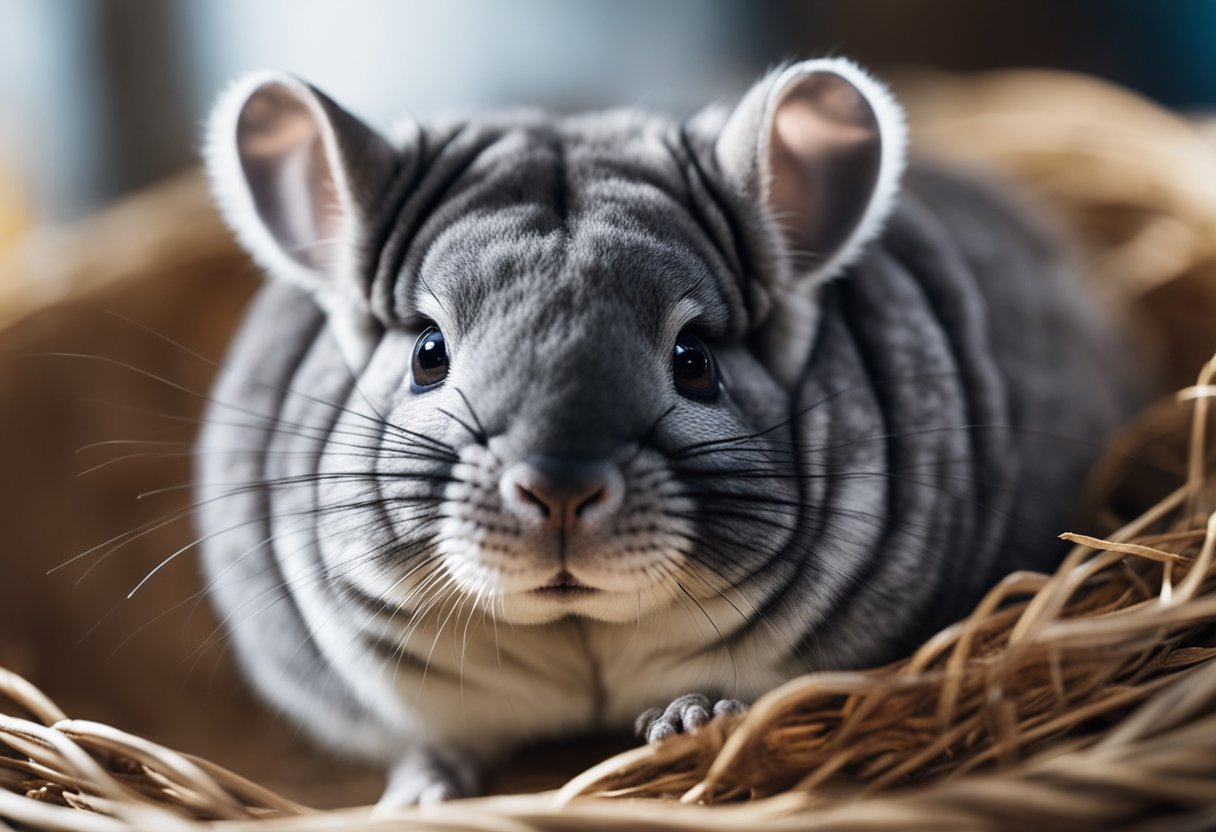Chinchilla pregnancy is an important topic for pet owners who want to understand their furry companions better. The average gestation period for chinchillas is about 111 days, roughly 3.5 months. Knowing this can help you prepare for the arrival of new kits and provide the best care for your pregnant pet.

During this time, it is crucial to offer your chinchilla a supportive environment. Pregnant chinchillas can display a bit of a change in behavior, and understanding these signs can make a difference in their comfort and health. You’ll also want to learn how to care for her as she approaches giving birth, ensuring that she has everything she needs.
Being aware of the pregnancy timeline and its implications allows you to take appropriate steps as a responsible pet owner. Whether you’re new to chinchilla care or looking to enhance your knowledge, these insights will help you navigate the journey of chinchilla motherhood successfully.
Key Takeaways
- Chinchilla pregnancies last approximately 111 days.
- Pregnant chinchillas need special care and attention during this time.
- Recognizing signs of pregnancy is vital for your chinchilla’s health.
Chinchilla Pregnancy Basics

Understanding the basics of chinchilla pregnancy is essential for responsible breeding. This includes knowing the length of the gestation period and recognizing the signs that indicate a chinchilla is pregnant.
Gestation Period
The gestation period for chinchillas typically lasts about 111 days, which is approximately three and a half months. This timeline can vary slightly among individual chinchillas, so it’s essential to monitor the mother closely.
During this period, it’s advisable to limit handling and minimize stress. The female chinchilla can mate 2-3 times a year, and she may have two litters per year. Each litter usually consists of 1 to 6 kits, or baby chinchillas. Proper care and an appropriate living environment are crucial at this time.
Signs of Pregnancy
You can look for several signs to determine if your chinchilla is pregnant. One common sign is weight gain. If the female chinchilla is steadily gaining weight after mating, she is likely pregnant.
Other behavioral changes may include increased aggression or nesting behavior. You might notice her gathering bedding materials or hiding. Each chinchilla may show different signs, so closely observing her habits is beneficial. Stress-reducing conditions, like a quiet habitat, can help during her pregnancy.
Caring for Pregnant Chinchillas

Caring for a pregnant chinchilla requires attention to her dietary needs, habitat adjustments, and health monitoring. These steps are crucial for ensuring the well-being of both the mother and her offspring.
Dietary Requirements
A pregnant chinchilla needs a nutrient-rich diet to support her and her growing babies. Focus on providing high-quality hay, which should make up the bulk of her intake. Timothy hay is a great option.
You should also add a mix of pellets specifically designed for pregnant or nursing chinchillas. Look for pellets that are high in fiber and protein.
Fresh fruits and vegetables can be offered in small amounts as treats. Avoid any foods that are high in sugar or fat, as these can cause health problems. Always provide fresh water to keep her hydrated, especially since drinking may increase during pregnancy.
Habitat Adjustments
Creating a suitable environment for a pregnant chinchilla is vital. Start by providing a spacious cage where she can move comfortably. Make sure the space allows her to have areas for hiding, as this offers her a sense of safety.
Keep the temperature of her habitat between 60-70 degrees Fahrenheit. Chinchillas are prone to heat stress, and maintaining a cool environment is key.
Place her cage in a quiet, low-traffic area to reduce stress levels. Avoid loud noises and sudden movements around her home. This can help her feel secure during this vulnerable time.
Health Monitoring
Regular health checks are essential during your chinchilla’s pregnancy. Watch for signs like increased sleeping or changes in eating habits. These can indicate she is nearing the end of her term.
It’s important to monitor her weight. Sudden weight gain or loss can signal potential health issues. By day 65, you should notice physical changes such as swollen teats.
If any unusual symptoms arise, consult your veterinarian immediately. Routine vet visits can help ensure her health and the health of her babies. A vet can also provide advice tailored to your chinchilla’s specific needs.
Resources
For additional guidance in caring for pregnant chinchillas, consider various resources. Books and online articles can provide a wealth of information on pregnancy care.
Veterinarians specializing in exotic pets can offer personalized advice focused on your chinchilla’s health. Websites like Planet Chinchilla provide insights on gestation and care tips.
Always stay informed through trusted resources to make the best choices for your pregnant chinchilla.
Frequently Asked Questions

Chinchilla pregnancy involves specific signs, behaviors, and timelines. Understanding these aspects is important for responsible care and breeding practices.
How to identify signs of pregnancy in chinchillas?
You can spot a pregnant chinchilla by monitoring her weight. Weight gain is the most noticeable sign as the pregnancy progresses. Look for behavioral changes such as increased nesting activity or a more reserved nature.
What is the typical litter size for a chinchilla?
Chinchillas usually have a litter size of one to three kits. It is common for first-time mothers to have just one kit. Older mothers may have larger litters, but three is the upper limit for most chinchillas.
At what age do chinchillas reach sexual maturity?
Chinchillas typically reach sexual maturity at around 8 to 10 months of age. It’s advisable to wait until they are fully mature before breeding to ensure better health for the mother and kits.
What is the duration of a chinchilla’s gestation period?
The gestation period for chinchillas ranges from 105 to 115 days. Most often, you can expect pregnancies to last about 111 days, or approximately 3.5 months.
Can chinchillas have multiple litters in a year, and if so, how many?
Yes, chinchillas can have multiple litters in a year. They are capable of breeding about two to three times a year, depending on their health and care.
What are the common behaviors observed in chinchillas during mating?
During mating, chinchillas may exhibit playful chasing and vocalizations. Males may also show more aggressive behavior, which is normal as they establish dominance. It’s important to monitor these interactions for the well-being of both chinchillas.

